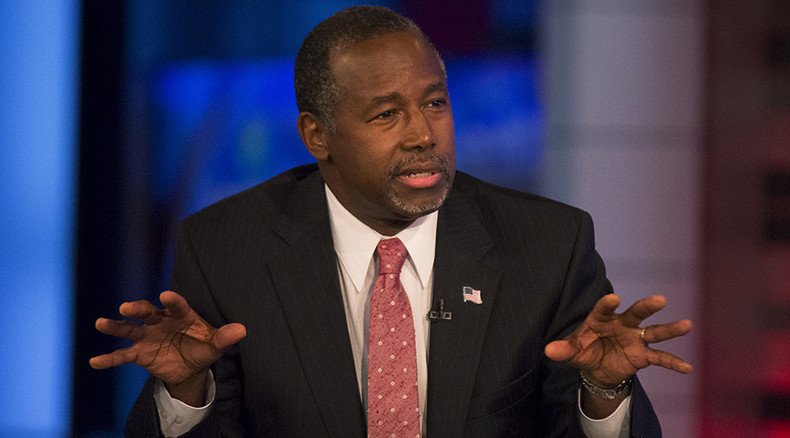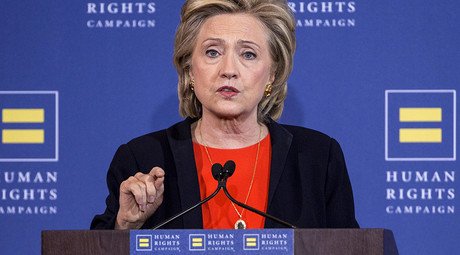Carson under fire over comment on Nazi gun control and Holocaust

When Dr. Ben Carson, a rising star among GOP presidential candidates, brought up the Holocaust in criticizing gun control, he offended many and attracted the ire of the mainstream media. Are Carson’s critics correct, or did the doctor read his history?
“I think the likelihood of Hitler being able to accomplish his goals would have been greatly diminished if the people had been armed,” Carson told CNN’s Wolf Blitzer on Thursday. “I’m telling you there is a reason these dictatorial people take guns first.”
The neuro-surgeon, currently polling second in the contest for the 2016 GOP presidential nomination, was referring to a passage from his new book, A Perfect Union, in which he argued that “through a combination of removing guns and disseminating deceitful propaganda, the Nazis were able to carry out their evil intentions with relatively little resistance.”
READ MORE: Gun control debate roils 2016 presidential campaign in wake of UCC massacre
The comments touched off a storm of protest in legacy and social media. A leading Jewish group blasted Carson for suggesting that gun control caused the Holocaust.
“Ben Carson has a right to his views on gun control, but the notion that Hitler’s gun-control policy contributed to the Holocaust is historically inaccurate,” said Jonathan Greenblatt, National Director of the Anti-Defamation League. “The small number of personal firearms available to Germany’s Jews in 1938 could in no way have stopped the totalitarian power of the Nazi German state.”
Numerous commentators on the political left took up arms against Carson’s comments, arguing that a few more guns in Jewish hands could not have stopped the Holocaust, and that the myth of Nazi gun control was manufactured by the conservative US media.
The origins of the infuriating conservative myth that gun control caused the Holocaust http://t.co/uAtotsfwwppic.twitter.com/VZs1zHtCnP
— Matthew Yglesias (@mattyglesias) October 9, 2015“Hitler conquered Europe with sophisticated combined arms operations that were able to defeat large, properly trained and equipped armies, and a few more small arms in the hands of a few more Jewish civilians clearly wouldn’t have made a difference,” Matthew Yglesias wrote in Vox.
If only 500,000 Jews had more guns they could have stopped 65 million Germans and prevented the Holocaust. Ben Carson, historian.
— John Fugelsang (@JohnFugelsang) October 9, 2015Over at the New Republic, Jacob Bacharach denounced Carson for the “hateful and frankly anti-Semitic assumption that the Jews of Europe stumbled meekly to their own slaughter,” pointing out that Jews did fight back, whether as partisans in the forests of Eastern Europe, or insurgents in the Warsaw Ghetto and even several death camps.
“This resistance was not successful. It reveals the lie in Carson’s real central claim. Armed citizens could not prevail against the might of the Wehrmacht,” Bacharach wrote.
Outlets like the Guardian, Huffington Post, and the Washington Post cited the candidate’s comments as “blaming the Holocaust on gun control.”
Ben Carson blamed the Holocaust on gun control http://t.co/SblgRFnZPrpic.twitter.com/DemY1vBkNC
— Huffington Post (@HuffingtonPost) October 8, 2015Ben Carson claims Jewish people might have stopped Holocaust if they had guns http://t.co/880ywebWzy
— The Guardian (@guardian) October 9, 2015On guns, Ben Carson seems like a neurosurgeon who performed his own lobotomy. http://t.co/KHjGU1IzSE
— The Nation (@thenation) October 7, 2015On Friday, Carson rejected the criticism as “total foolishness.”
“I’d be happy to discuss that in depth with anybody, but it is well known that in many places where tyranny has taken over they first disarm the people,” he told George Stephanopoulos on ABC’s Good Morning America. “There’s a reason they disarm the people. They don’t just do it arbitrarily.”
Appearing on Fox News’ America’s Newsroom, Carson blasted the “immature attitude” of some Americans who, he said, look for things to be offended by rather than listening to what people are actually saying.
Carson didn't say guns would've prevented Holocaust. He said armed populus would've diminished Hitler's ability to accomplish goals.
— Bill Billison (@BillBillison1) October 9, 2015Carson’s critics point to the Wikipedia entry on German gun control laws, which shows that in 1919 the Weimar Republic outlawed the possession of all firearms and ammunition, and that a 1928 law actually relaxed these restrictions. Hitler’s 1938 law made it even easier for Germans to possess firearms – if they were Nazi sympathizers, that is. Jews were prohibited not only from owning guns, but any weapons whatsoever.
One of the most exhaustive examinations of Nazi gun control policies is an essay by legal scholar Dr. Stephen Halbrook, published in the Arizona Journal of International and Comparative Law in 2000. Germany’s strict gun laws were introduced after the 1919 Spartacist revolt, when pro-government militias (Freikorps) would shoot armed civilians on the spot, Halbrook noted.
The 1928 law abandoned the unenforceable ban on all weapons in favor of universal registration and strict licensing, which Halbrook argues enable the Nazis to systematically disarm political opponents and Jews, starting in 1933. Tens of thousands of Germans were executed, and three million were imprisoned for political reasons, suggesting a sizeable opposition to the Nazis that lacked the means to resist.
“If the Nazi experience teaches anything, it teaches that totalitarian governments will attempt to disarm their subjects so as to extinguish any ability to resist crimes against humanity,” Halbrook concluded.
Halbrook’s work is by no means accepted as an axiom, though, even as both sides in the gun control debate cite it to bolster their own arguments.













